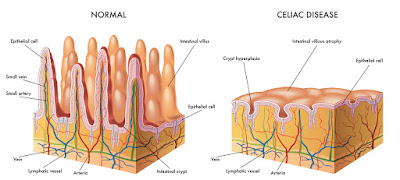“I know I’m just a liver so why am I talking about an autoimmune disease? Autoimmune diseases and I are closely related. There are so many autoimmune disorders that affect my function and cause damage that could lead to cirrhosis. I feel it’s important to know all that they can about me and my role in your body.” Thanks, Morgan d'Organ
WHAT IT IS:
When most of us hear about Celiac Disease, we think of it as a gluten allergy. That is not what it is at all. It is a genetically linked autoimmune disease in which people can’t tolerate gluten. When you eat or use products containing gluten, your immune system sees it as an “invader” and begins a process to attack it.
This attack is aimed at your villi-tiny fingerlike projections on the inner lining of your small intestine. The villi is what absorbs the nutrients and the immune system is trying to keep your body from absorbing the “toxic” substance.
This attack is aimed at your villi-tiny fingerlike projections on the inner lining of your small intestine. The villi is what absorbs the nutrients and the immune system is trying to keep your body from absorbing the “toxic” substance.
Gluten is a protein found in wheat, rye, barley, and sometimes, oats and occasionally in products like vitamin supplements and even some medications.
SYMPTOMS:
You may experience digestive signs and symptoms, or symptoms in other parts of your body (since it is an autoimmune disorder). Digestive signs are more common in children and can include:
- Abdominal bloating
- Chronic diarrhea
- Constipation
- Gas
- Pale, foul-smelling stool or fatty stool (your body can’t absorb fats)
- Stomach pain
- Nausea
- Vomiting
Being unable to absorb nutrients during the years when nutrition is critical to a child’s normal growth and development can lead to other health problems, such as:
- Failure to thrive in infants
- Slowed growth and short stature
- Weight loss
- Irritability or change in mood
- Delayed puberty
- Dental enamel defects of permanent teeth
Adults are less likely to have digestive issues and symptoms but, may instead, have one or more of the following:
- Anemia
- Bone and/or joint pain
- Canker sores inside your mouth
- Depression or anxiety
- Dermatitis herpetiformis – an itchy, blistering skin rash
- Fatigue
- Infertility or recurrent miscarriage
- Missed menstrual periods
- Seizures
- Tingling numbness of your hands or feet
- Weak, brittle bones or osteoporosis
- Headaches
Intestinal inflammation can cause:
- Feeling tired for long periods of time
- Abdominal pain and bloating
- Ulcers
- Blockages in your intestine
Celiac Disease can also produce an autoimmune reaction, or a self-directed immune reaction. This can spread outside of your gastrointestinal tract and present in other areas including:
- Spleen
- Skin
- Nervous system
- Bones
- Joints
- Liver
WHO IT AFFECTS:
This disorder can affect both children and adults who are genetically predisposed to it. 1 in 141 Americans have Celiac Disease. It is more common in Caucasians and females and in people with certain genetic diseases.
According to the National Health and Nutrition Examination Survey (NHANES) Study of the CDC, 80% of those with this disorder have yet to be diagnosed.
There are currently dozens of clinical trials underway, or concluded, researching every aspect of this disease. At the current time, there is no known cure and the best treatment is a strict adherence to a gluten-free diet. Celiac Disease is a life-long disease managed by lifestyle and generally without medication.









Great description, from a CD endured. Also mention that it is genetic, as all four of my children have it as well.
ReplyDelete